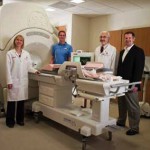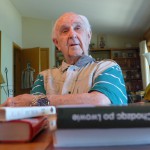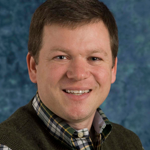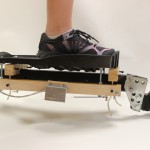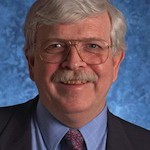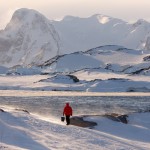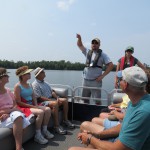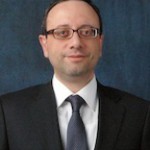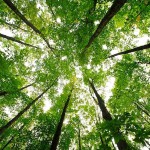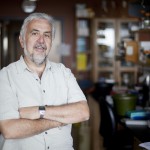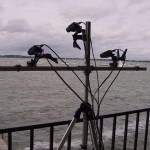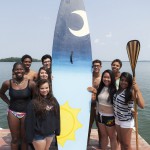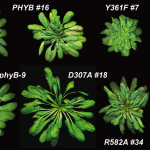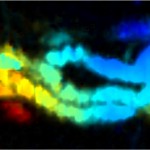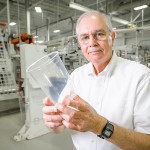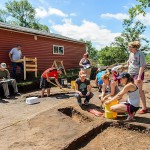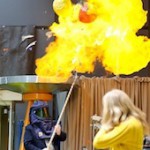Category Science & Technology
UW-Madison chosen for federally funded cloud computing research
Cloud computing, which allows users of technology to tap into remote, shared infrastructure and services, is a major facet of today’s world. Whether or not we realize it, countless aspects of our daily lives — from social media to drug discovery — are now enabled by cloud computing. The University of Wisconsin–Madison has been chosen to be part of a National Science Foundation-funded project called CloudLab — a joint effort of university and industry teams for the development of cloud infrastructure and fostering the high-level research that it supports.
University spinoff aims to hit the mark precisely with brain-scanning tool
As brain surgeons test new procedures and drugs to treat conditions ranging from psychiatric disorders to brain cancer, accuracy is becoming an ever-greater issue.
Legend in genetics at forefront of book about heroism during 20th century’s darkest hours
Waclaw Szybalski, 92, a genius of genetics who has been repeatedly mentioned as a candidate for the Nobel Prize, grew up as an aspiring scientist during World War II in the eastern part of Poland. Many of Szybalski's most significant wartime roles concerned a decidedly applied type of science: He cooked TNT so the Polish resistance could sabotage rail lines. He participated in smuggling typhus vaccine to Jews in the Warsaw Ghetto. And he fed lice and supervised "louse feeders."
Herbarium director receives award for telling the story of plants
Ken Cameron, director of the Wisconsin State Herbarium, received the Peter Raven Award from the American Society of Plant Taxonomists Aug. 5. Cameron, also a professor of botany at the University of Wisconsin–Madison, is a world expert on the orchid family.
No one-size-fits-all approach in a changing climate, changing land
As climate change alters habitats for birds and bees and everything in between, so too does the way humans decide to use land. Researchers at the University of Wisconsin–Madison and Aarhus University in Denmark have, for the first time, found a way to determine the potential combined impacts of both climate and land-use change on plants, animals and ecosystems across the country.
Grants fund UW technology projects on the road to commercialization
An exercise machine that helps stroke victims walk. An advanced technology for assessing the progress of prostate cancer. A faster process for making neural stem cells to investigate new treatments for injury and disease. A cheaper, more beautiful LED light bulb. A game to teach meditation. These projects, and a dozen more, are beneficiaries of the first round of awards by the University of Wisconsin–Madison’s Discovery to Product, or D2P, program, which began operating in March.
New analysis links tree height to climate
What limits the height of trees? Is it the fraction of their photosynthetic energy they devote to productive new leaves? Or is it their ability to hoist water hundreds of feet into the air, supplying the green, solar-powered sugar factories in those leaves?
Climate conundrum: Conflicting indicators on what preceded human-driven warming
When the Intergovernmental Panel on Climate Change recently requested a figure for its annual report, to show global temperature trends over the last 10,000 years, the University of Wisconsin–Madison’s Zhengyu Liu knew that was going to be a problem. Writing in the journal Proceedings of the National Academy of Science today, Liu and colleagues describe a consistent global warming trend over the course of the Holocene, our current geological epoch, counter to a study published last year that described a period of global cooling before human influence.
Water’s reaction with metal oxides opens doors for researchers
A multi-institutional team has resolved a long-unanswered question about how two of the world’s most common substances interact. In a paper published recently in the journal Nature Communications, Manos Mavrikakis, professor of chemical and biological engineering at the University of Wisconsin–Madison, and his collaborators report fundamental discoveries about how water reacts with metal oxides
Fundamental plant chemicals trace back to bacteria
A fundamental chemical pathway that all plants use to create an essential amino acid needed by all animals to make proteins has now been traced to two groups of ancient bacteria. The pathway is also known for making hundreds of chemicals, including a compound that makes wood strong and the pigments that make red wine red.
Mining bacterial blueprints yields novel process for creation of fuel and chemical compounds
A team of researchers at the University of Wisconsin–Madison has identified the genes and enzymes that create a promising compound — the 19 carbon furan-containing fatty acid (19Fu-FA). The compound has a variety of potential uses as a biological alternative for compounds currently derived from fossil fuels.
Pre-college programs open doors for leadership roles
Whether their connections were social, academic or professional, former participants in UW–Madison's summer residence programs through University Housing say the camps were essential for creating future opportunities.
Tricking plants to see the light may control the most important twitch on Earth
Copious corn growing in tiny backyard plots? Roses blooming in December? Thanks to technology that the University of Wisconsin–Madison’s Richard Vierstra has been developing for years, these things may soon be possible. And now, new findings out of the genetics professor’s lab promise to advance that technology even further.
Wisconsin plastics industry has roots in modest, multitalented UW–Madison professor
“The Graduate” is a running joke in the plastics industry. In that 1967 Dustin Hoffman movie, a character famously — and accurately — summarized the future in one word: “Plastics.” The movie may have been influential, but Tom Mohs, founder of the Madison plastics manufacturer Placon, says he owes nothing to it. “I was already buying my second thermoforming machine when the movie came out,” says Mohs. “No, I owe it to Ron Daggett.”
The Wonders of Physics to hold special event Aug. 15
The Wonders of Physics, a long-running science outreach effort at the University of Wisconsin–Madison, will host a special preview of its new presentation, “The Physics of Plasma,” as part of a fundraising event Aug. 15.

